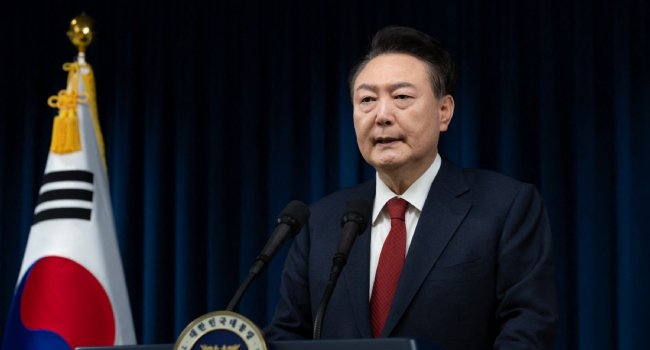Headlines
South Korean President Barred from Leaving Country Amid Controversy

On the night of December 3, Yoon dispatched special forces and helicopters to parliament; however, lawmakers compelled him to retract the order by rejecting his decree.
The highly unpopular leader narrowly escaped an impeachment motion in parliament on Saturday, while large crowds endured the freezing temperatures to demand his removal.
Despite still being in office, Yoon and his close associates are increasingly under scrutiny due to a series of investigations, including one examining alleged insurrection.
On Monday, the Ministry of Justice confirmed that Yoon had become the first incumbent South Korean president to face a travel ban.
During a parliamentary hearing on Monday, a lawmaker inquired if Yoon had been prohibited from leaving the country. Bae Sang-up, an immigration services commissioner at the ministry, confirmed this by responding affirmatively.
In addition, travel bans have been imposed on former defense minister Kim Yong-hyun, who is currently detained, and ex-interior minister Lee Sang-min for their involvement in last week’s events.
General Park An-su, who oversees the martial law operation, along with Yeo In-hyung, the defense counterintelligence commander, are both prohibited from leaving the country.
On Monday, investigators brought Park in for additional questioning.
— ‘Second coup’ —
The attempt to push through the impeachment did not succeed, as members of Yoon’s own People Power Party (PPP) exited parliament, preventing it from reaching the required two-thirds majority.
The PPP states that Yoon, 63, has consented to transfer power to the prime minister and party leader in exchange, which has elicited strong protests from the opposition.
“This is an illegal and unconstitutional action, resembling a second insurrection or coup,” stated Democratic Party floor leader Park Chan-dae on Monday.
According to South Korea’s constitution, the president serves as both head of government and commander in chief of the army unless incapacitated, resigns, or steps down.
In this scenario, authority would be temporarily transferred to the prime minister until elections could take place.
Park stated that asserting Yoon can stay in office while transferring his powers to the prime minister and leader of his ruling PPP, who is unelected, represents “a blatant constitutional violation with no legal basis.”
He stated, “Their attitude of considering themselves superior to the constitution reflects that of insurrectionist Yoon Suk Yeol.”
— A power vacuum? —
The defense ministry announced on Monday that despite an apparent power vacuum, Yoon remains in charge of the nation’s security apparatus. This is occurring while the country, technically still at war with nuclear-equipped North Korea, seeks stability.
“According to the law, control of military forces is currently held by the commander in chief,” stated Jeon Ha-kyou, spokesperson for the Ministry of Defense.
Yoon has apologized for the “anxiety and inconvenience” caused by his declaration of martial law, but he has not resigned. Instead, he stated that he would leave decisions regarding his future to his party.
He also stated that he would take full political and legal responsibility for the mishandling of martial law.
According to Kim Hae-won, a constitutional law professor at Pusan National University Law School, there is no constitutional justification for the ruling party’s assertion that Yoon can remain in office while transferring his authority to unelected party officials.
“It appears to resemble an unconstitutional soft coup,” he told AFP.
“If there are issues with the president, constitutional measures can be taken such as suspending him from his duties and then proceeding to steps outlined in the constitution like impeachment,” he stated.
The opposition has announced their intention to make another attempt at impeaching Yoon. Leader Lee Jae-myung stated that they plan to hold a subsequent vote on Saturday.
A large turnout is anticipated once more outside the National Assembly building.
According to a recent Gallup poll commissioned by local media, Yoon’s approval rating has dropped to 11 percent, marking a historic low for the already unpopular president.
